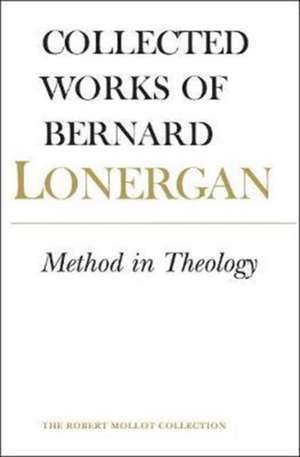Method in Theology: Collected Works of Bernard Lonergan
Autor Bernard Lonerganen Limba Engleză Paperback – 10 aug 2017
This critical edition has benefited from extensive research into Lonergan's typescripts and from consulting the recordings from several institutes where he lectured over the course of the work's development. Lonergan's intention was to provide a set of methods that would guide a collaborative community in the ongoing construction of a theology that would move from recovery of the data through resolution of conflicts to contemporary formulations and applications. With this work, the cognitional theory of Insight: A Study of Human Understanding underwent a surprising set of developments in the form of what he calls functional specialization.
Preț: 312.49 lei
Nou
Puncte Express: 469
Preț estimativ în valută:
59.80€ • 61.96$ • 49.91£
59.80€ • 61.96$ • 49.91£
Carte disponibilă
Livrare economică 01-15 martie
Livrare express 15-21 februarie pentru 46.12 lei
Preluare comenzi: 021 569.72.76
Specificații
ISBN-13: 9781487522247
ISBN-10: 148752224X
Pagini: 456
Dimensiuni: 233 x 158 x 31 mm
Greutate: 0.7 kg
Editura: University of Toronto Press (Scholarly Pub)
Seria Collected Works of Bernard Lonergan
ISBN-10: 148752224X
Pagini: 456
Dimensiuni: 233 x 158 x 31 mm
Greutate: 0.7 kg
Editura: University of Toronto Press (Scholarly Pub)
Seria Collected Works of Bernard Lonergan
Descriere
In Method in Theology, Vol. 14, Lonergan's intention was to provide a set of methods that would guide a collaborative community in the ongoing construction of a theology that would move from recovery of the data through resolution of conflicts to contemporary formulations and applications.










